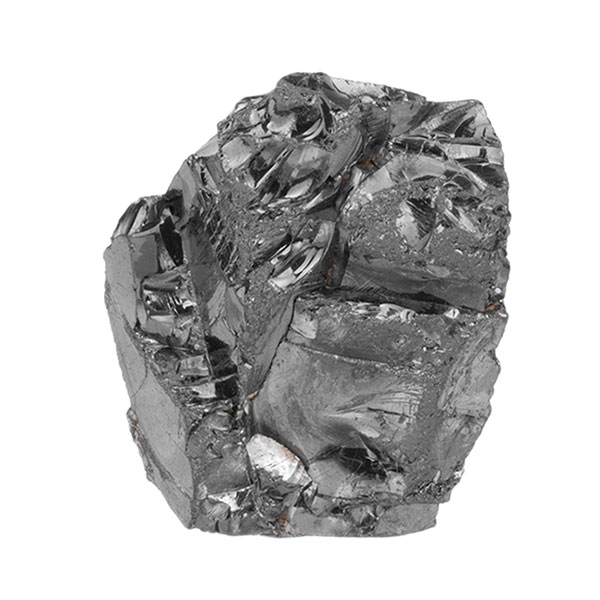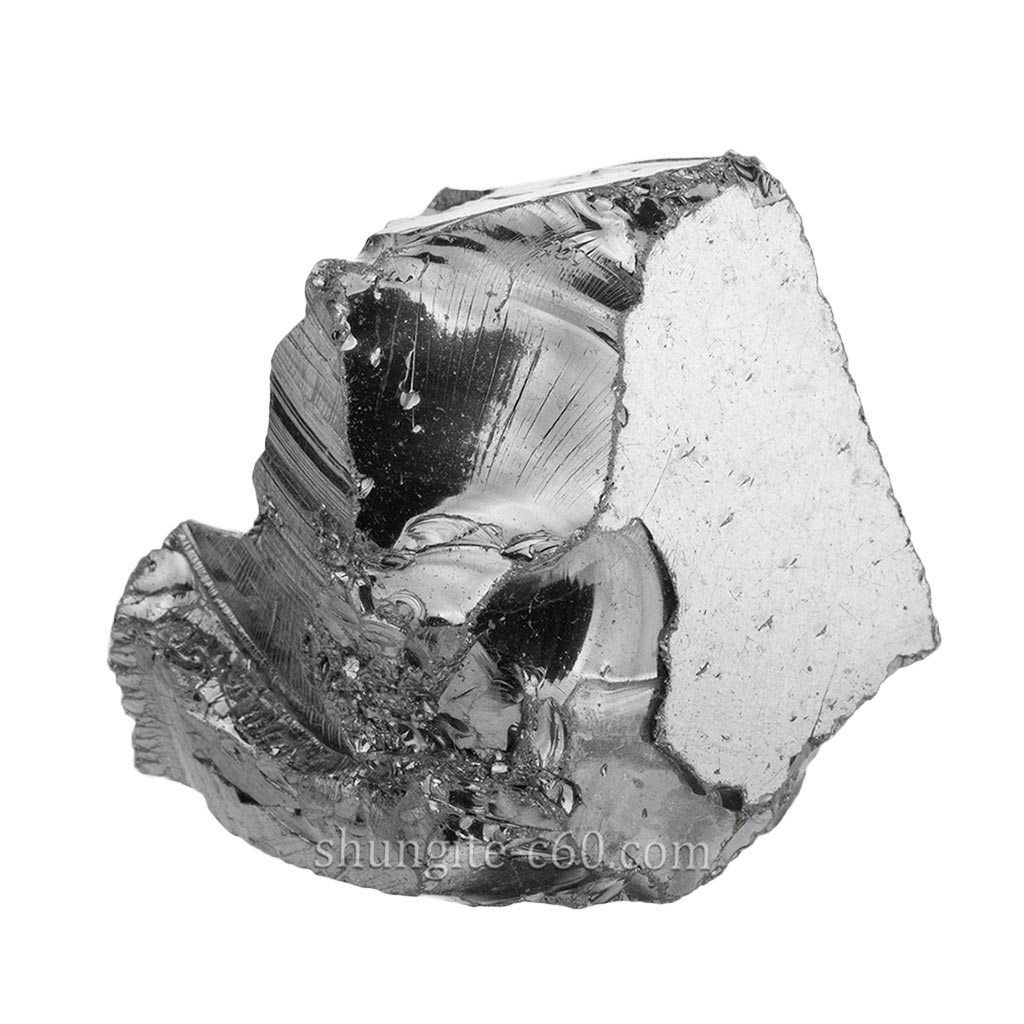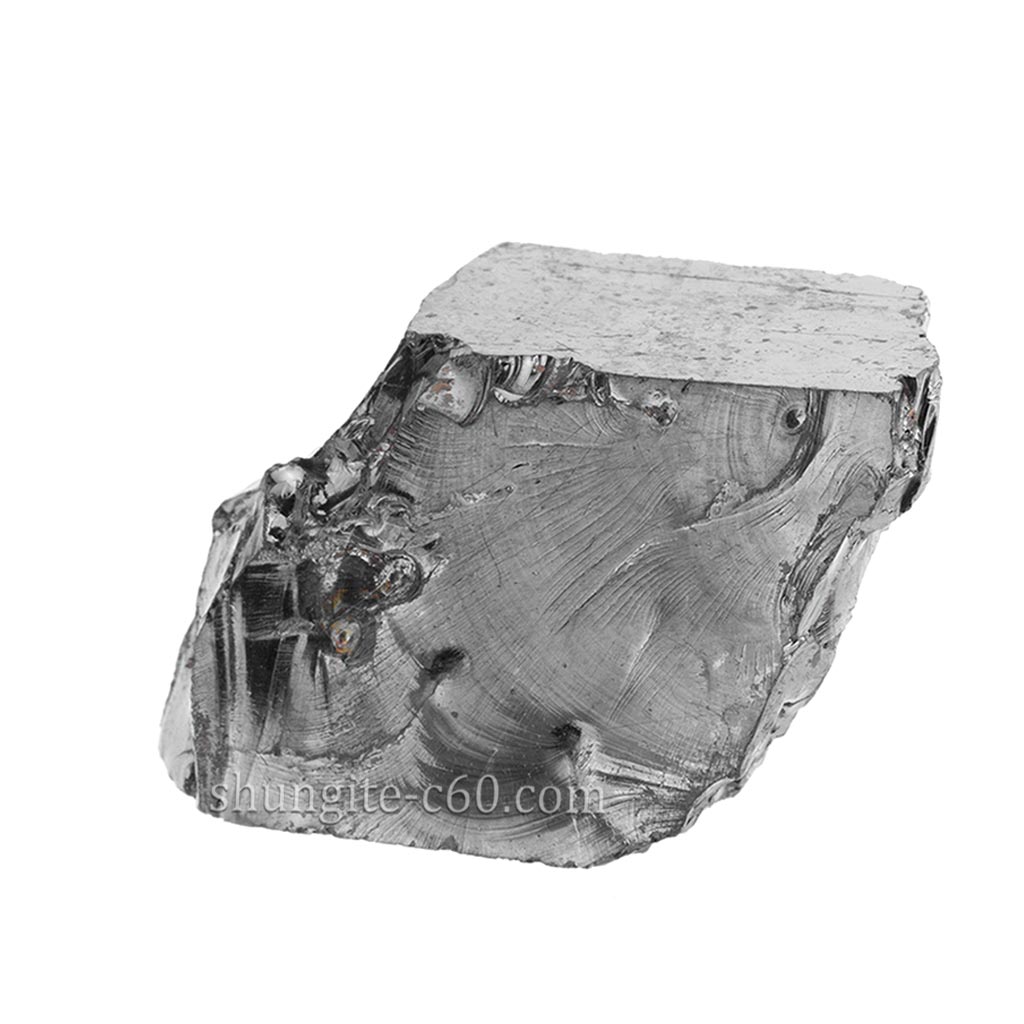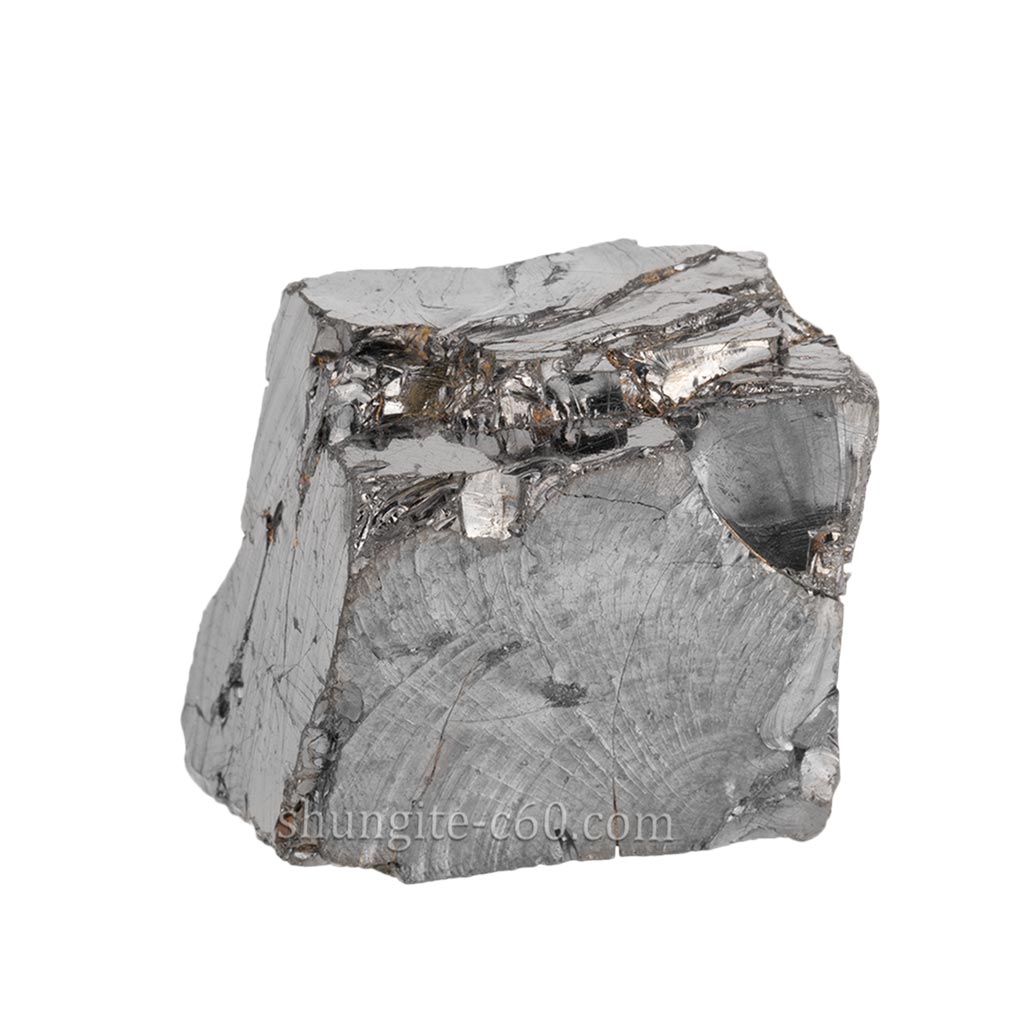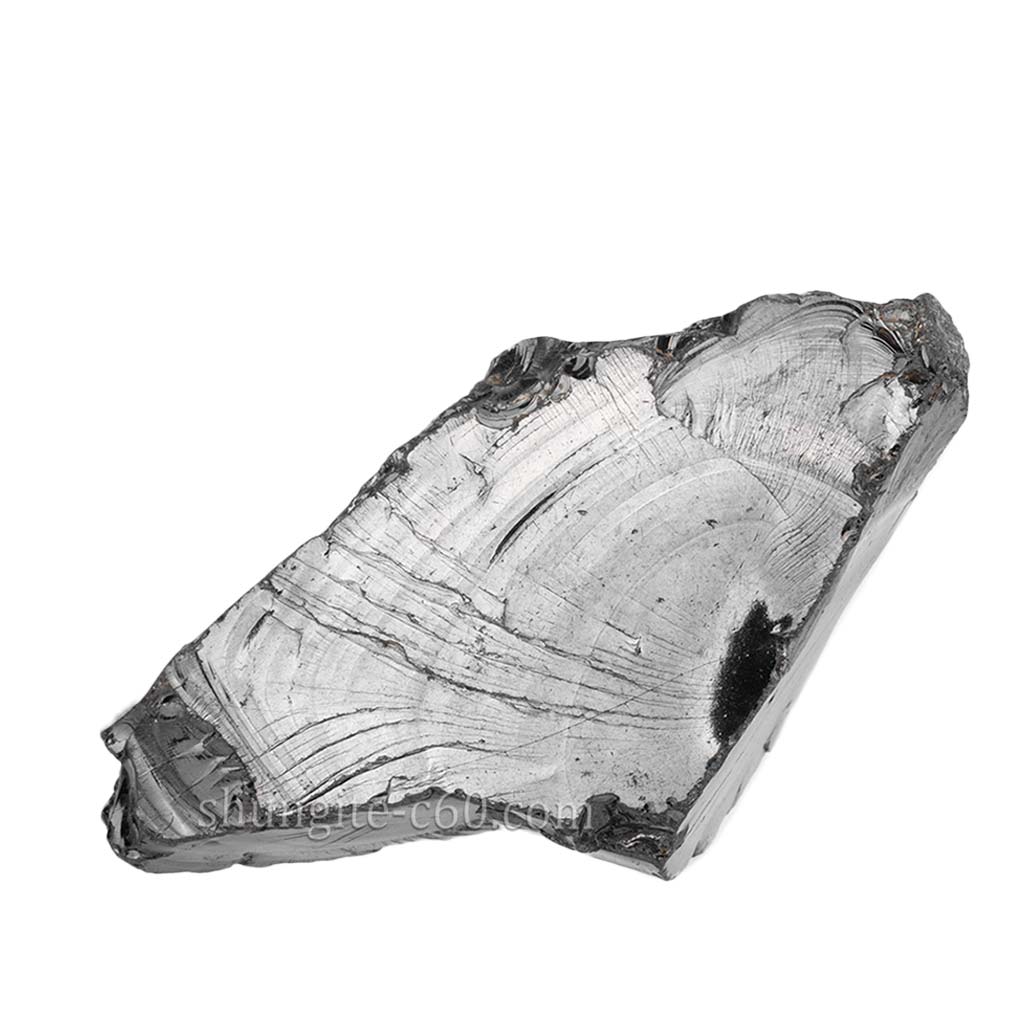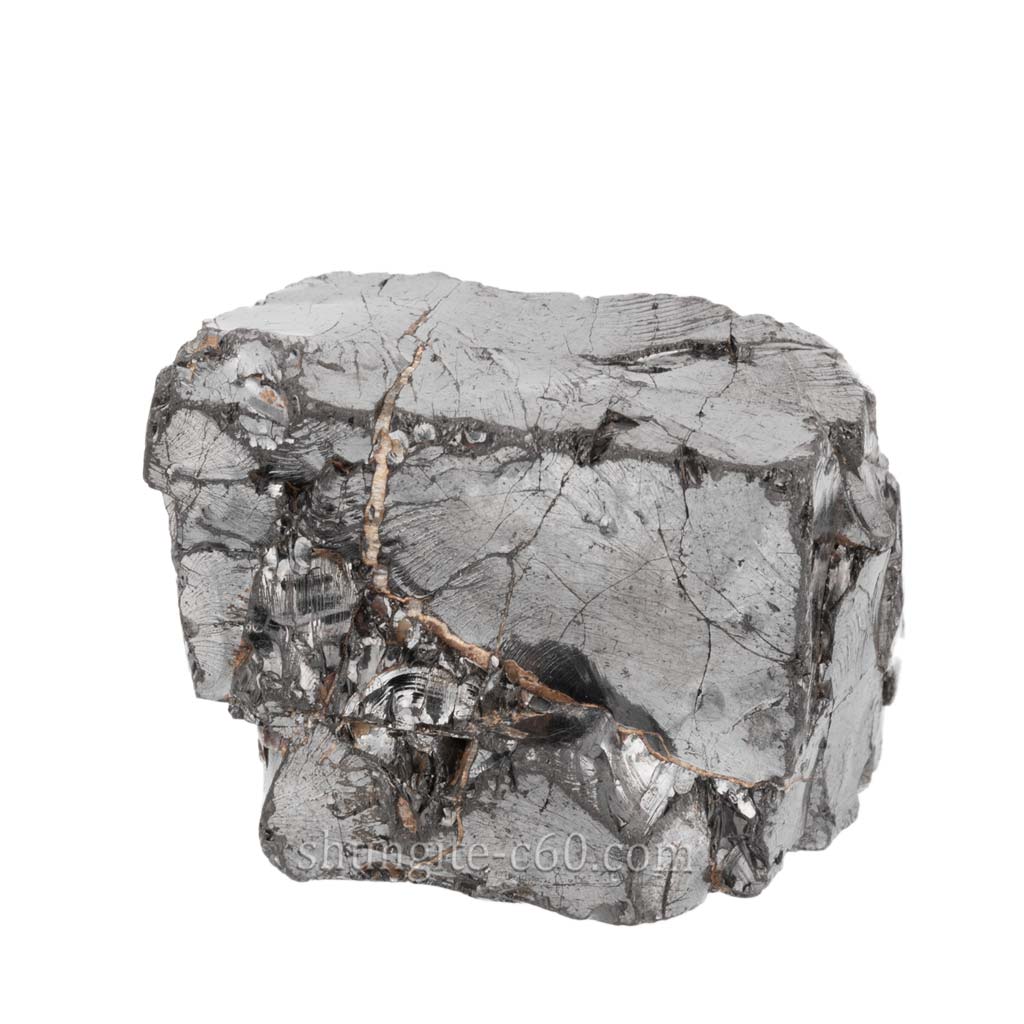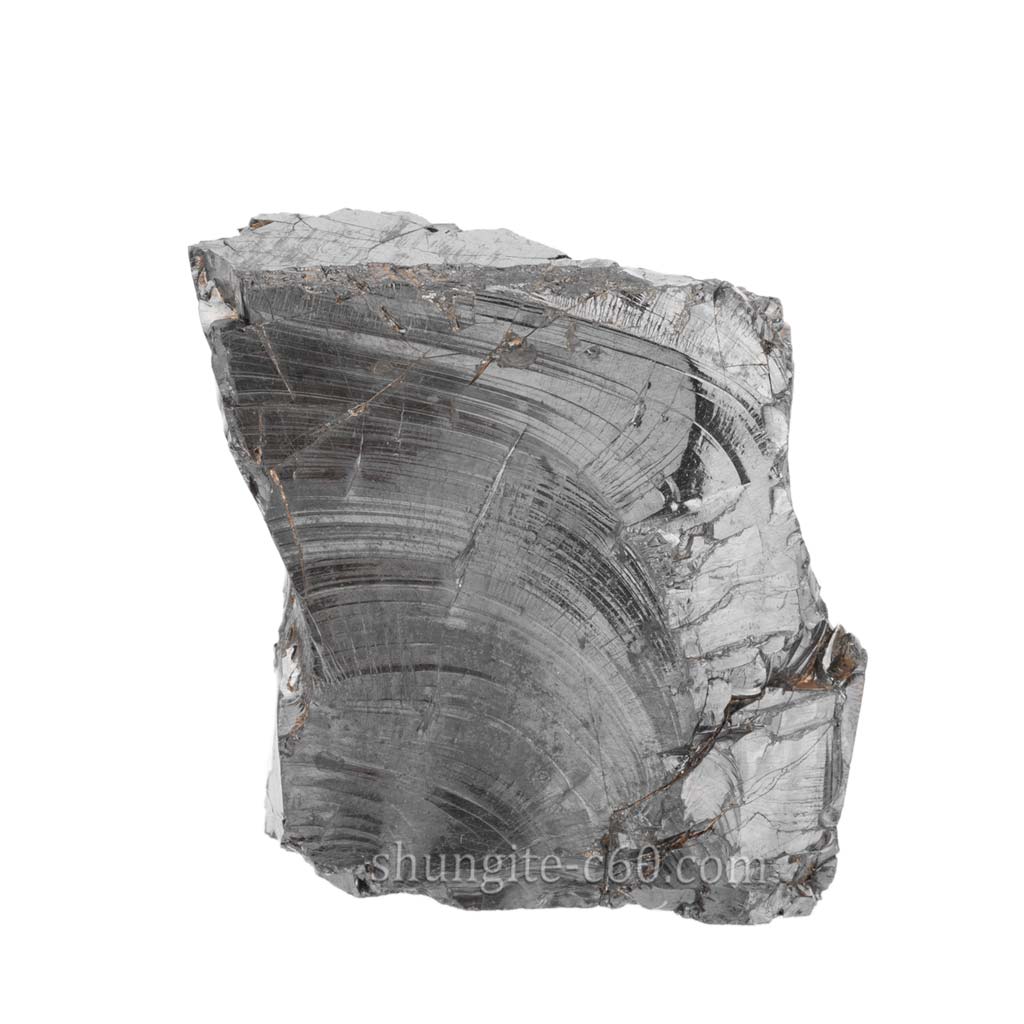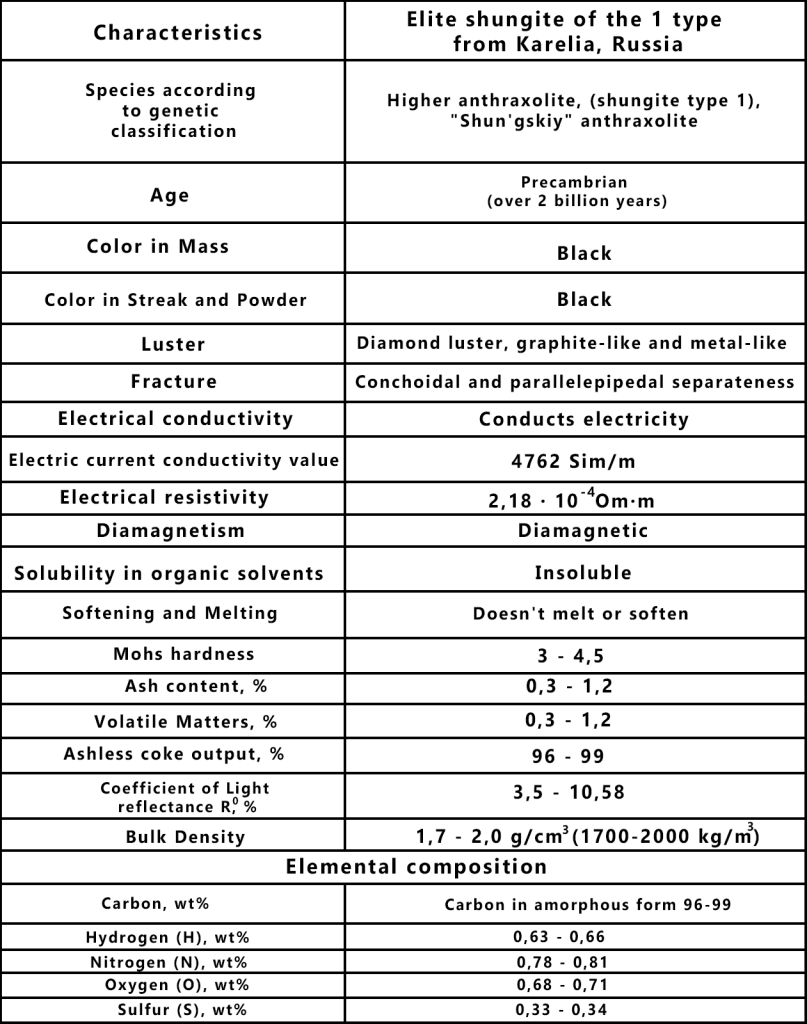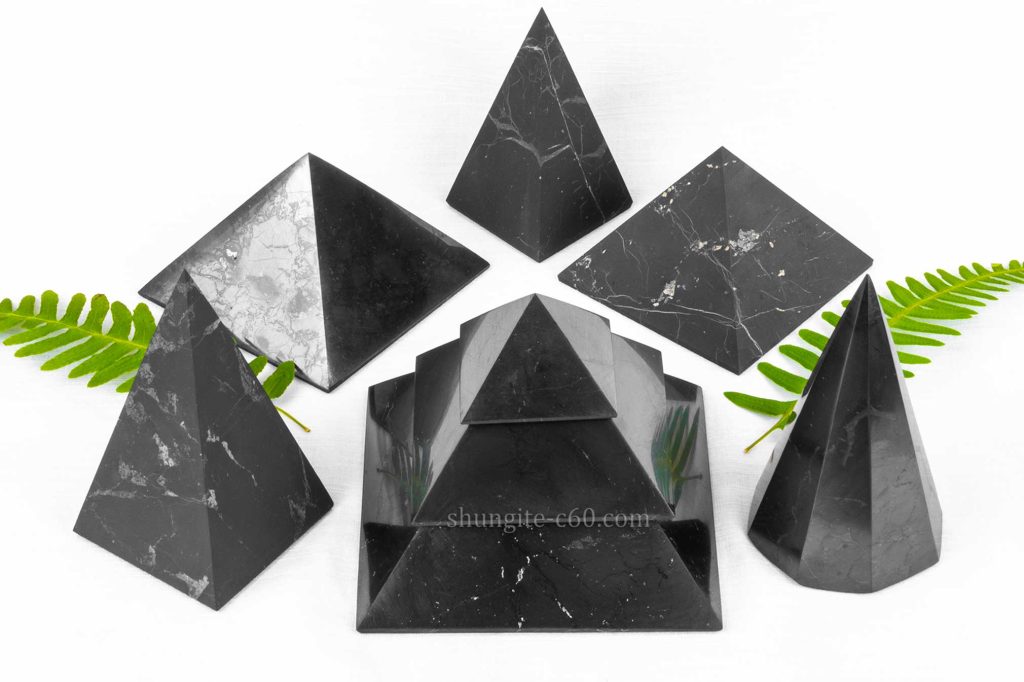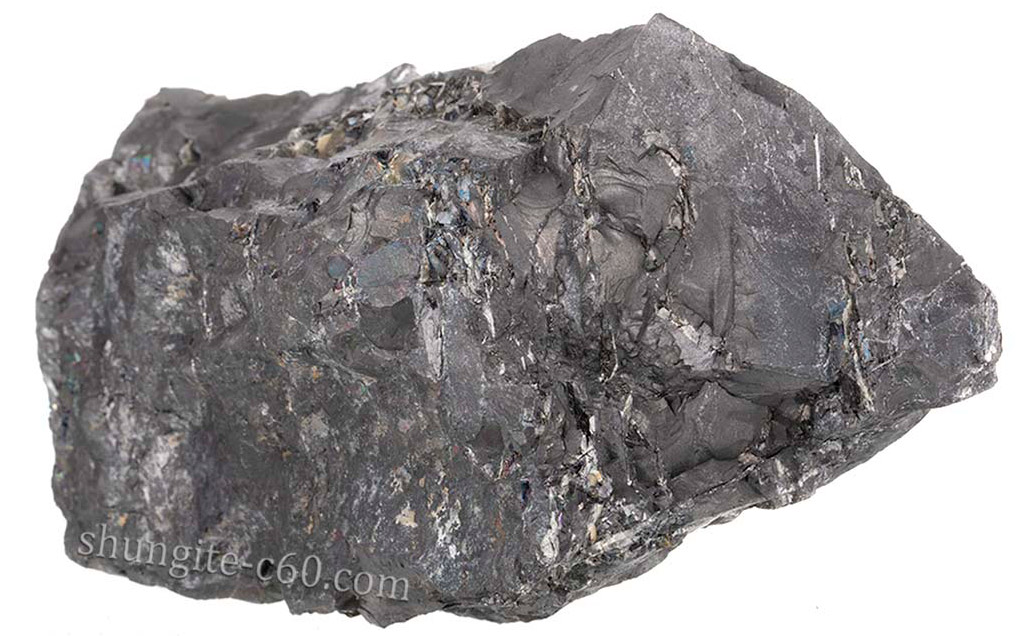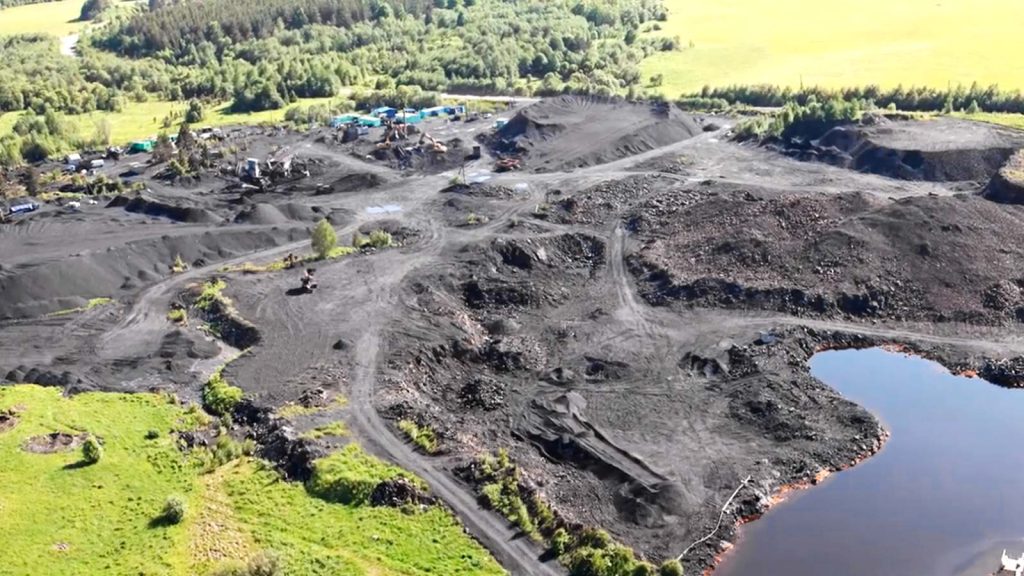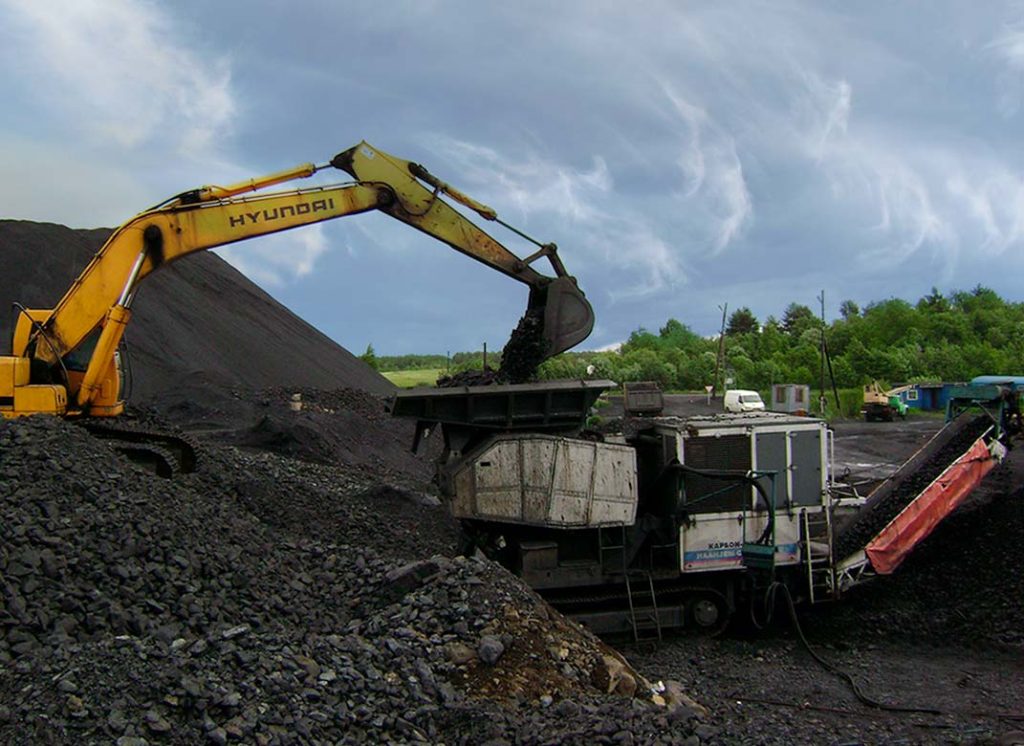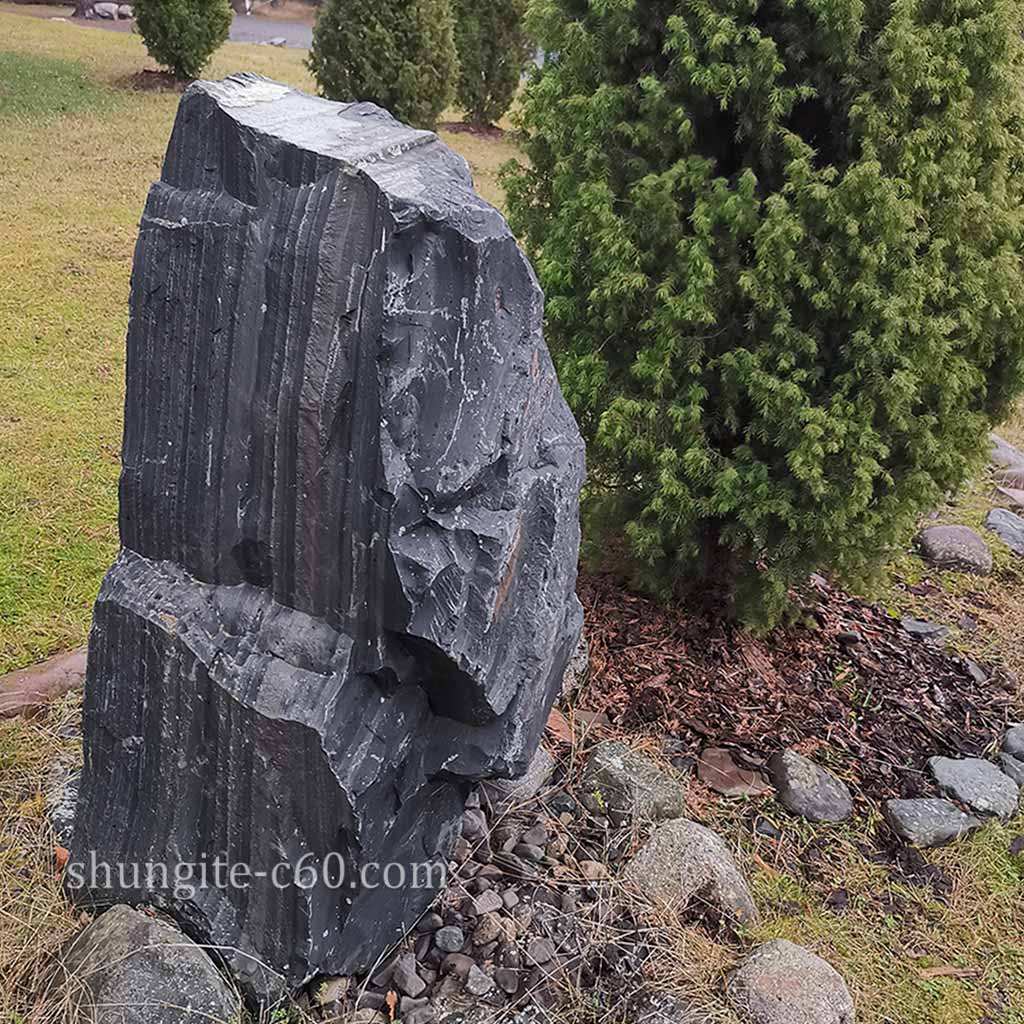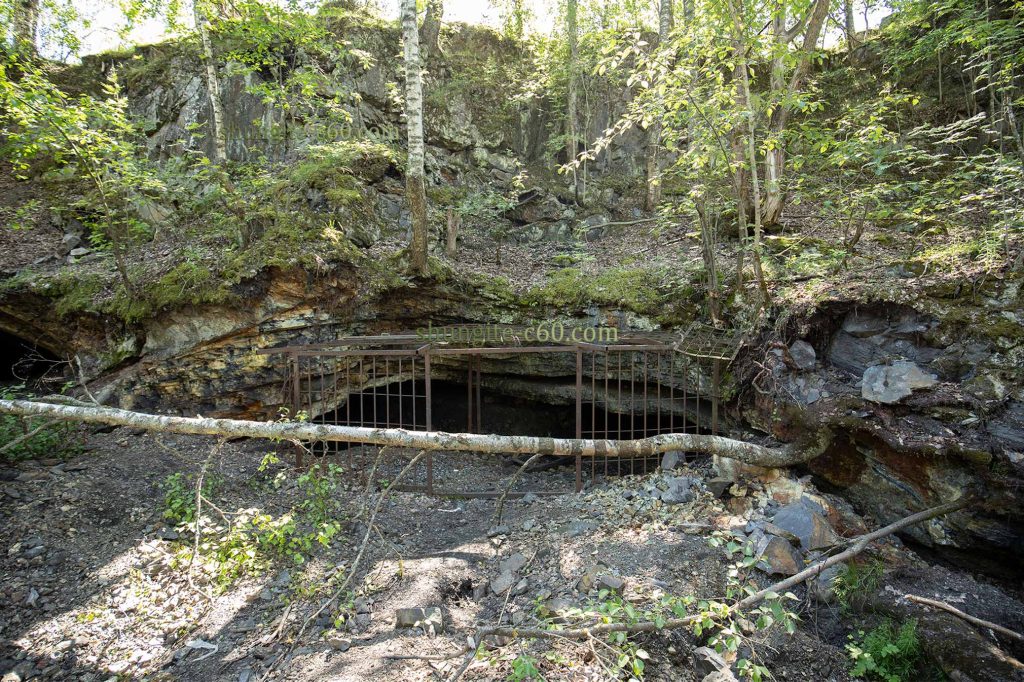In this article, we will talk about one of the rarest rocks, which has a silver color and is often called elite shungite. We will try to explain the situation around this silvery mineral. Many of our clients and people interested in rare rocks do not fully understand the type of mineral we are talking about in each case.
Many companies and other sellers use a variety of names and add-ons for this Russian rock. As a result, it becomes difficult for an ordinary person to understand what kind of mineral is in question and how it differs from other types.
To begin with, it is necessary to determine that science identifies three main types of this rock from Russia. In this article, we will discuss the first type in detail and answer most questions about elite shungite. We also recommend that you read this basic scientific article, which describes in detail and compares all three types of shungite.
Elite Shungite: Meaning
In short, It is a rare Russian mineral of light grey color with a high 98% allotropic carbon content. This mineral belongs to the highest group and is the 1st type.
Also, it has high reflectivity, which makes it look like silver in the light. Therefore, a type 1 noble stone is perceived as a silver-colored stone that reflects daylight and has a smooth surface similar to glass. The luster of elite shungite can be described as diamond-like or metallic. The reflection index (R0 ) for elite shungite ranges from 3,5 to 10,5 %.
Amidst the vast world of Russian minerals and rocks, there exists a variety of Russian rock that is so rare and powerful that it has earned the name “Elite.” Often referred to as “Noble,” “First Type,” or “Silver,” this remarkable stone possesses unique qualities and a rich history that make it highly sought after. In this article, we will delve into the captivating meaning of Elite Shungite, exploring its origin, properties, and significance.
Elite Noble shungite: What is it?
This rare mineral received an additional prefix: the word Elite or Noble. It emphasizes his personality and the benchmark.
From a scientific point of view, elite shungite is a rare and ancient mineral of the Precambrian period, and it is more than 2 billion years old. Scientists attribute it to the class of the highest anthraxolite or “Shunga” anthraxolite (the highest anthraxolite from Shunga). This small village of the same name is a deposit of type 1 noble stone in Karelia, Russia.
First type
Also, according to other classifications, elite shungite can be called stone of the first type.
The silver stone type 1 conducts electricity and is diamagnetic. The electrical conductivity of the silver color stone is 4762 Sim/m.
It does not dissolve in organic solvents and chloroform, decompose, or melt. When heated, it does not give liquid products; it cracks.
Type 1 noble stone has a black streak and black powder. It has a conchoidal fracture, metallic or diamond luster, and a bulk Density of 1.7-2.0 gr/m3. Hardness on the Mohs scale ranges from 2-3 to 4.5. The allotropic form of carbon is 96-99%, and hydrogen content is about 1%. The composition contains heteroelements (N, S, O). Also, the elite representative of this mineral does not get his hands dirty and contains the largest number of fullerenes.
Samples of type 1 silver minerals:
Where did the elite Shungite come from
The exact origin of elite Shungite on earth has not been established. The age of elite shungite is a little over 2 billion years, and the planet Earth is about 4.54 billion years.
There are many scientific theories about the origin of this type 1 silver color stone. One such theory suggests that this form of carbon came to Earth from space with an Alland meteorite. This theory is based on the fact that such a form of carbon does not exist in other materials or rocks on Earth. In addition, the only small corner on our planet where the silver mineral met until today is the Northern region of Russia-Karelia. This is the North-Western region of Russia on the border with Finland.
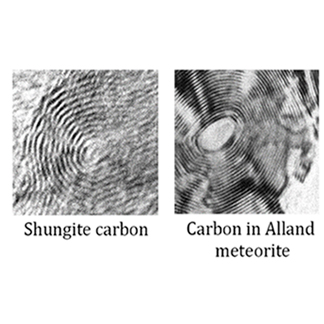
Deposit of this rare mineral
The Republic of Karelia is the first and only region where this rare mineral has been discovered. In addition, during the Soviet Union, this single large Deposit was utterly exhausted. We were in this abandoned mine in one of Shunga’s Karelian villages. It is a tiny mine with a depth of about 20 meters and a height of only about 1-3 meters.
Inside the Mine
The shaft walls are rock consisting of quartz, plagioclase, potassium feldspar, mica, and the world-famous minerals quartz and pyrite. It is this stone that makes the walls of the mine rusty. In addition, Pyrite (which has a Golden color if it has not been oxidized by oxygen under the influence of water) is an integral companion for this Russian stone. This same mineral leaves some traces and veins of rust on the stone’s surface. This abandoned mine is now fenced with a cage because of the constant collapses inside the mine.
The tunnels inside the Mine

Unknown rare mineral
This stone deposit ceiling could collapse because meltwater flooded the mine in the spring of each year. Soil is made loose, and there is a danger of collapse in this connection. It is every year. The story of where all these stones came from his deposit was not published in official sources. There were probably many reasons for this in the past. This mineral has almost disappeared from nature, and we only have small crumbs.
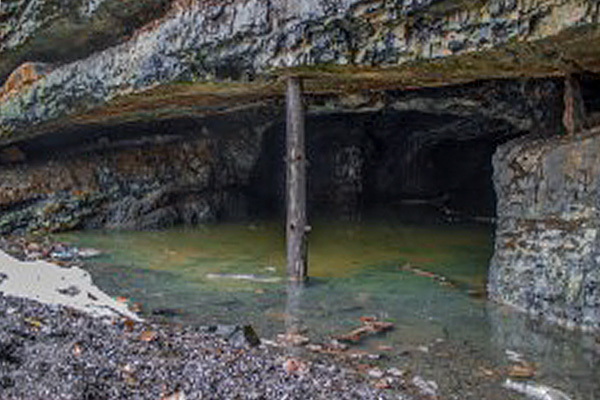
A piece of accompanying stone at the price of a rare mineral
Currently, in this deposit of elite shungite in the village of Shunga, you can find only what is left outside because the veins of type 1 noble stone have already been dug out. In turn, with free access from out and around, only such rocks as ladies, dolomites, and siltstones remained in this field.
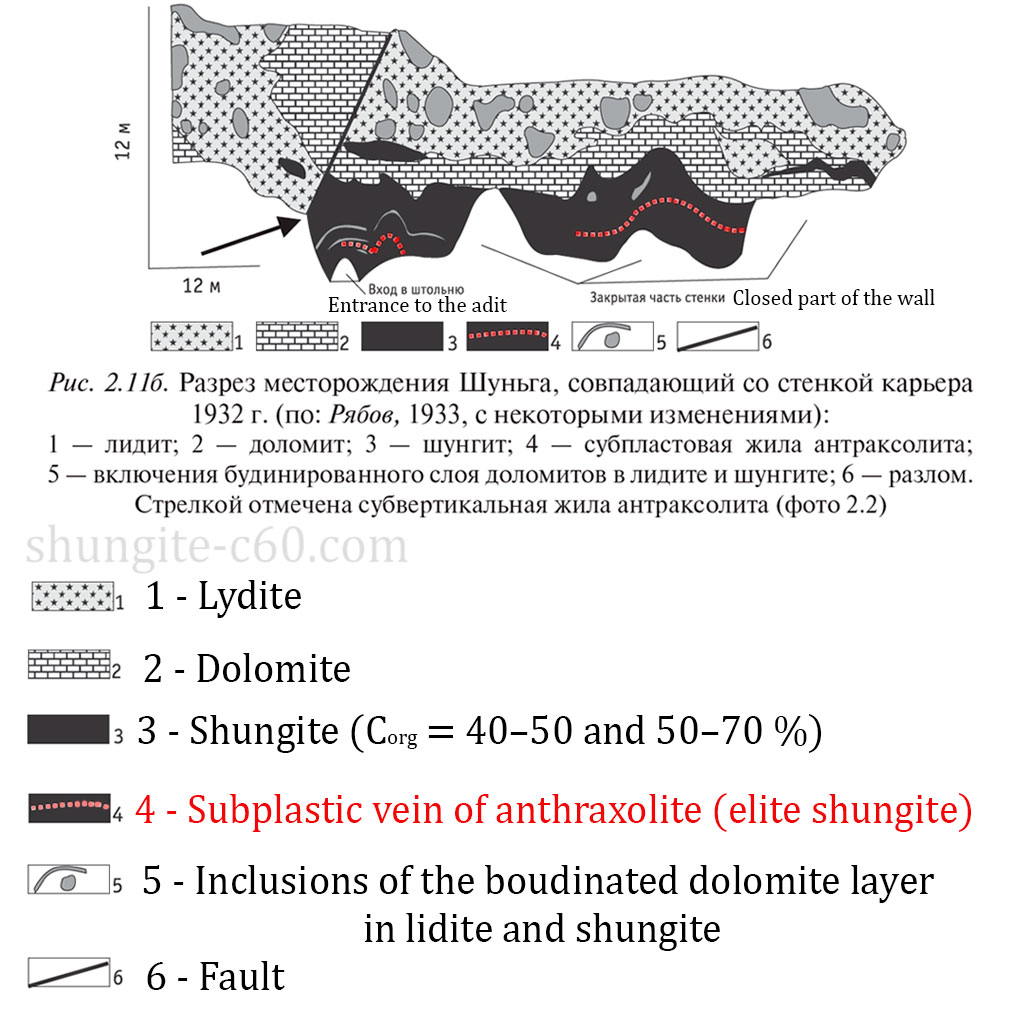
Please look at this schematic map of the type 1 noble stone deposit in the village of Shun’ga, sketched by N.I. Ryabov. Here, you will see a schematic representation of the amount of the noble mineral (shown in red under the number 4) and associated rocks. Elite shungite is called the highest anthraxolite in scientific literature. Meanwhile, you can estimate how small the inclusions of elite shungite veins were in 1933. And in our time, after almost 90 years, the field is practically depleted.
You can see many of the rocks and stones in that deposit. Associated minerals include lidites (number 1), dolomites (number 2), shales, and siltstones. Some of them in a certain classification are called “suite-bearing rocks” because they contain a couple of percent unique carbon, such as lyddite.
You can agree with the geologists who evaluated this haft’s conclusions that the quantity of elite shungite veins is less than 2% of the mine volume.
Dolomite or something similar instead of elite shungite stone
Unfortunately, many of our buyers wrote to us that they received different products that other sellers passed off as actual silver color type 1 noble stone. Thus, unscrupulous sellers could sell them samples of accompanying minerals or other similar-looking minerals. At the same time, the risk of counterfeiting increases when buying from different countries of the world or even other cities in Russia. At the same time, the sellers themselves can be sure they are selling something real because they were told that these stones are directly from that adit. But the question remains: how different are these samples from those under your feet in your country?
This genuine type 1 noble stone exists in nature through tiny veins. Above all, we note that finding such veins becomes more difficult every year. These veins are scattered along the shores of Lake Onego, and seeing such a vein is extremely hard and is excellent luck. It takes a lot of time, effort, and various resources. In other words, there were only small crumbs of this rare stone. It is most likely that finding such a mineral will no longer be possible in the near future.
We want to draw your attention to the fact that we use only verified samples of elite stones. For this, we made a geological examination of our specimens at the Geological Institute of Karelia in Petrozavodsk. You can also familiarize yourself with it in the photos in this article below.
We also constantly consult there with professional geologists from this scientific geological institute.
98% Carbon chemical composition of elite shungite
Type 1 noble stone is 98% unique carbon. The remaining 2% is a variety of chemical elements from the periodic table. Here is a list of these chemical elements identified when analyzing elite shungite using the x-ray fluorescence method in special laboratory conditions. We made measurements and chemical analysis of samples of elite shungite at the Institute of Geology of the Karelian Scientific Center of the Russian Academy of Sciences (Russian Academy of Sciences), the city of Petrozavodsk.
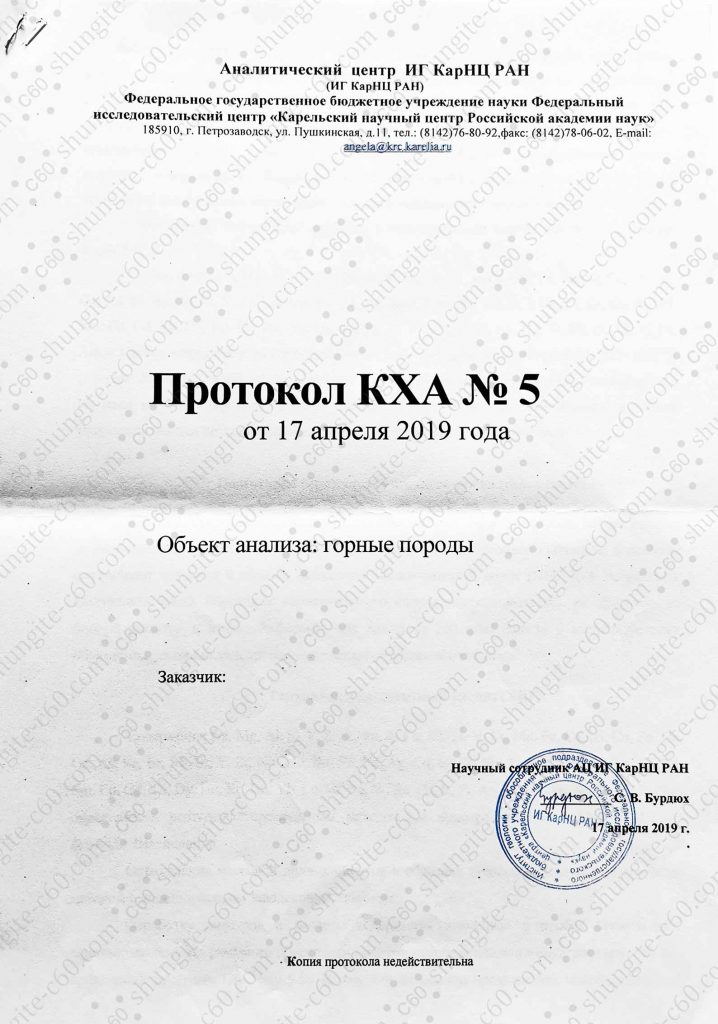
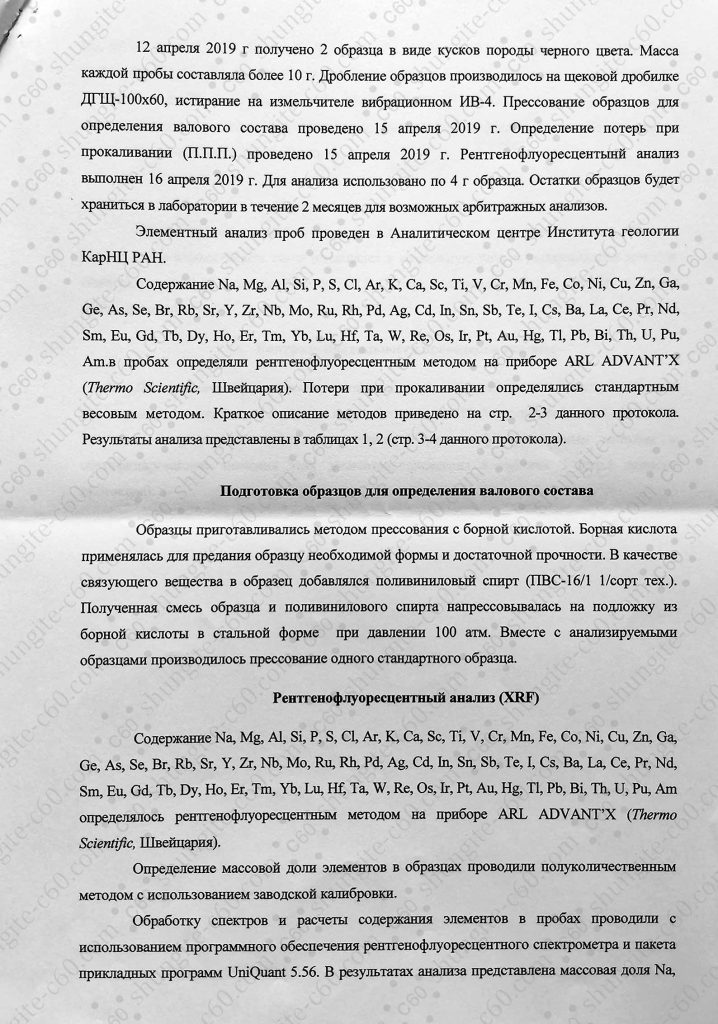
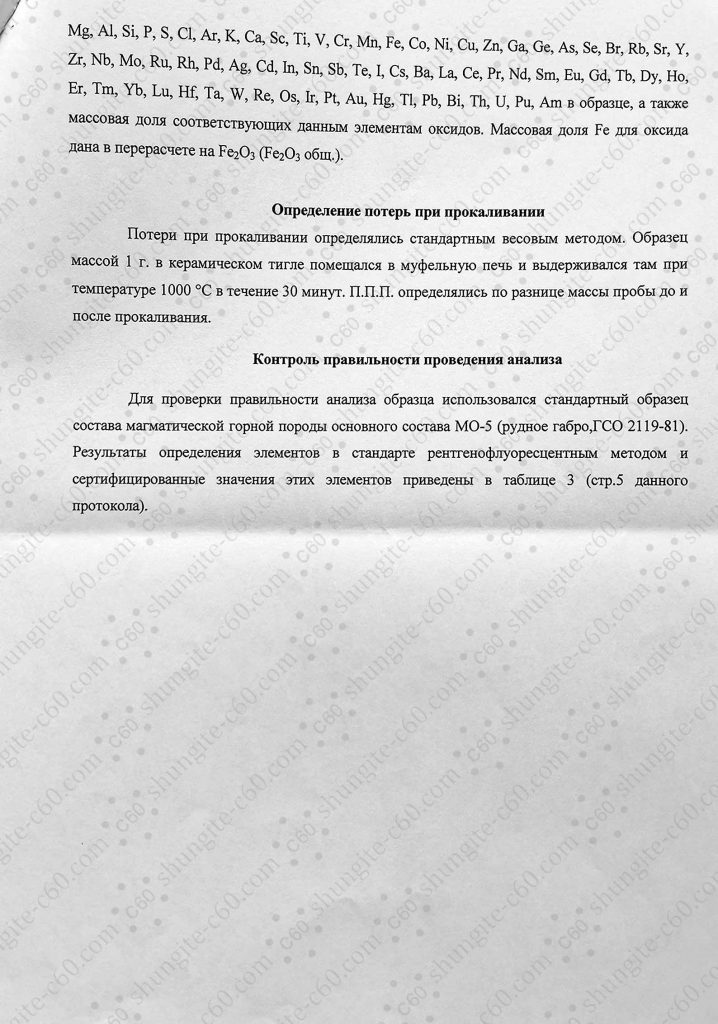
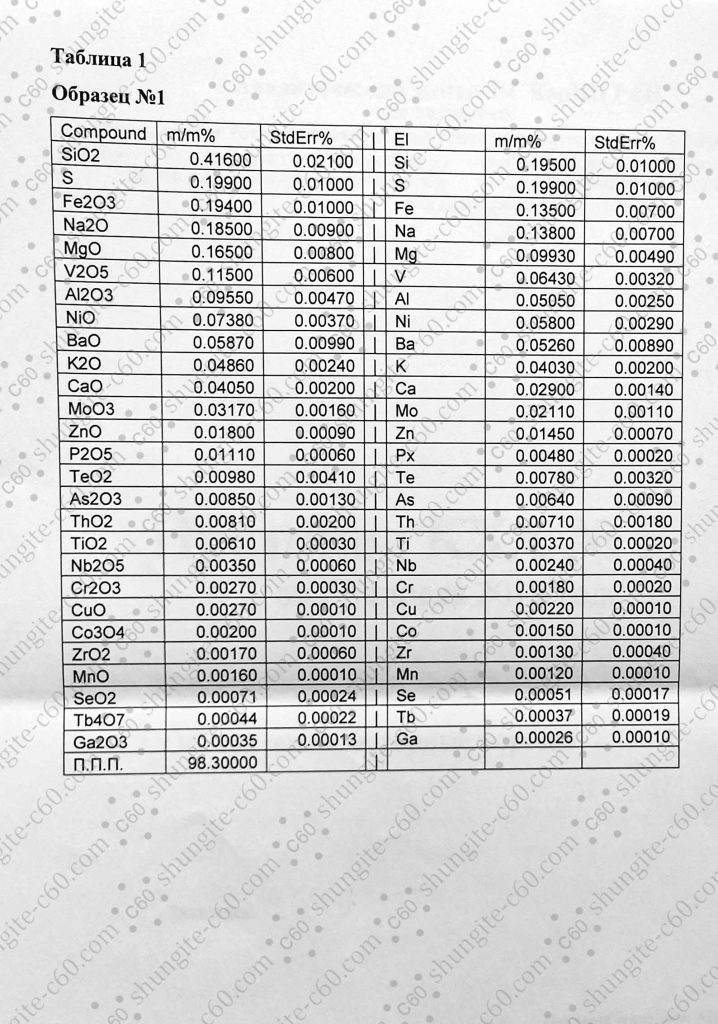
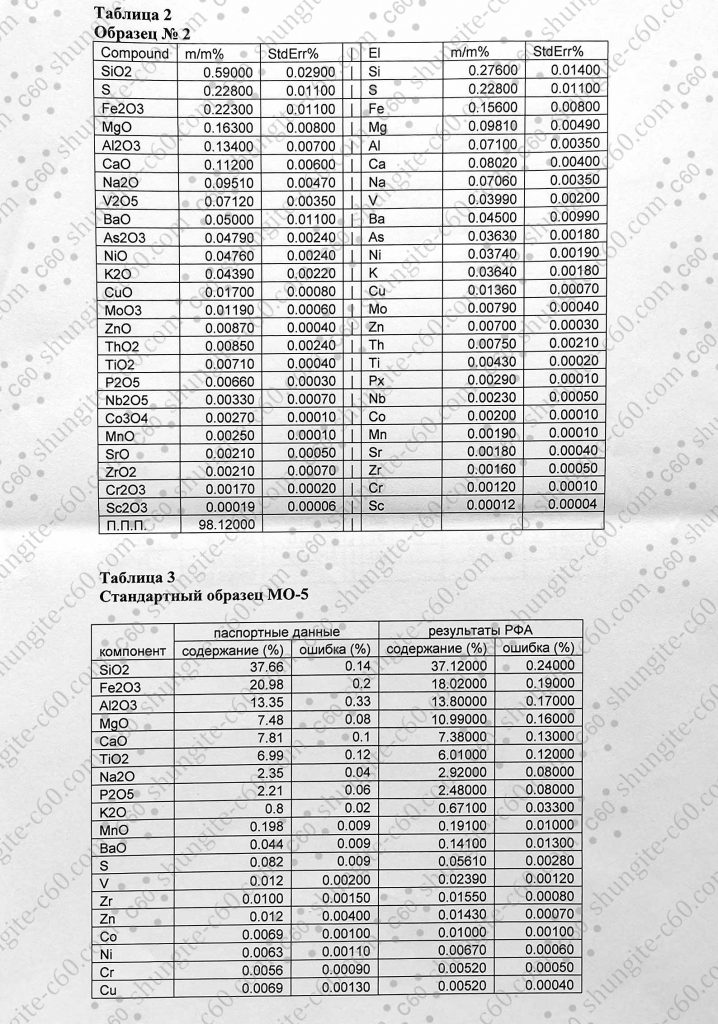
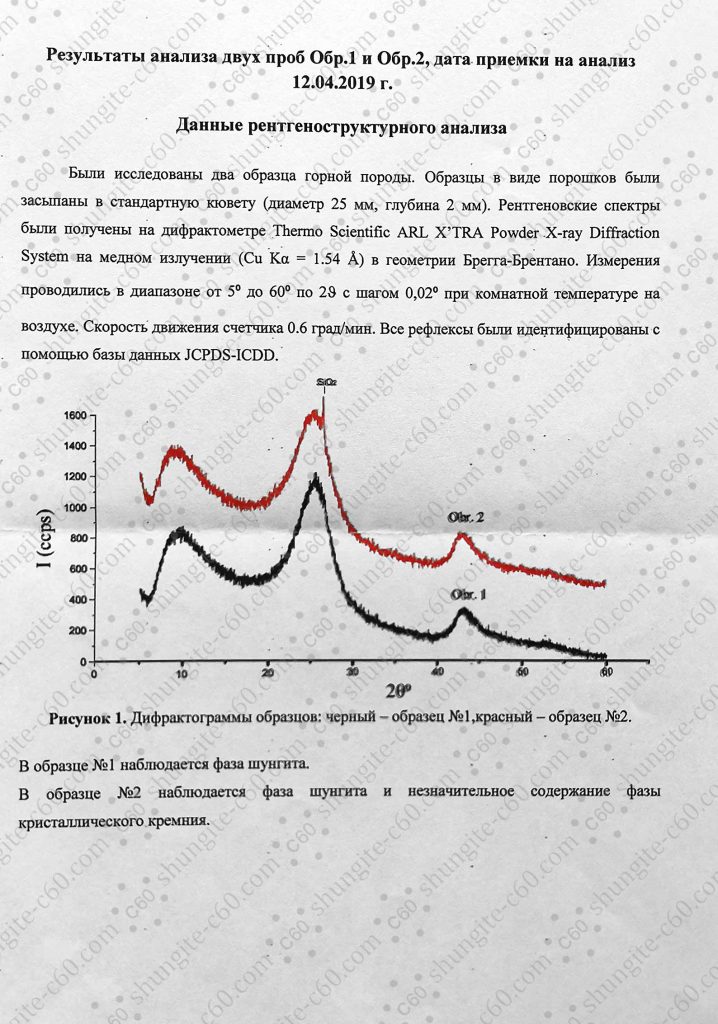
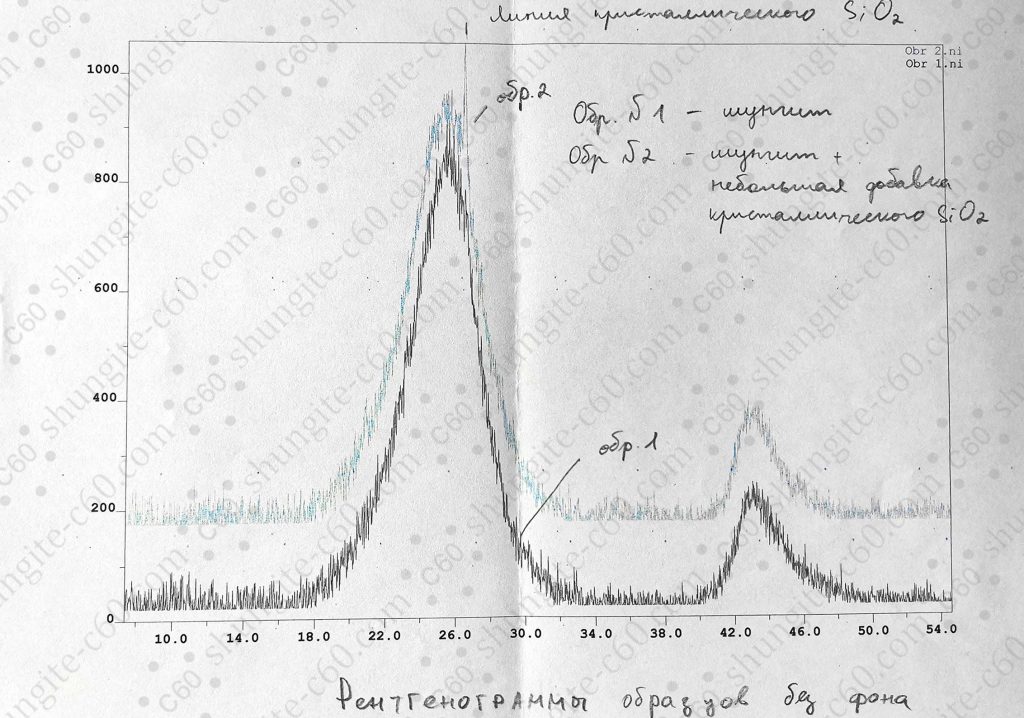
Chemical and physical characteristics of Elite shungite of the first type from Karelia
We have prepared a table of general physical and chemical characteristics for samples of elite shungite of the first type from the Shungskoye deposit in Karelia, Russia.
What is the color of elite shungite?
This rare stone is black. However, type 1 noble stones can reflect sunlight well, so in the rays of light and in good light, real elite shungite will seem silvery to you. The reflection index (R0 ) for elite shungite ranges from 3,5 to 10,58 %.
Therefore, in good light, this rare stone has a light gray smooth surface. The surface is like glass; it is smooth and pleasant to the touch. It reflects light well, like a mirror. As a result, we see how this silver-colored Russian stone shines with a diamond or metallic sheen.
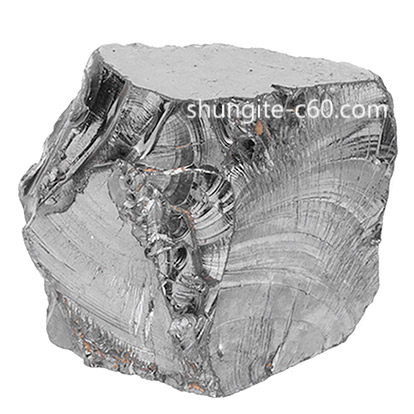
Electrical conductivity of authentic Elite shungite
Electrical conductivity is the most essential characteristic of elite shungite. After all, the Karelian type 1 stone is the only mineral and non-metal that conducts electricity well. The stone’s electrical conductivity is 4762 Sim/m. Its specific resistance to electric current is 2,18 ∙ 10-4 Om∙m.
Due to its ability to conduct electricity and special structure, scientists have found that type 3 and 1 black stones can absorb and reflect harmful electromagnetic waves of high frequency.
Thus, the ability to conduct electricity puts elite shungite at the very top of the classification of rocks with carbon content. Therefore, in scientific circles, type 1 noble stone is called the highest anthraxolite, a group of ancient minerals with the highest degree of carbon metamorphism.
You can check the electrical conductivity of elite shungite using a light bulb test or a multimeter. As a result, the electrical conductivity of type 1 noble stone is the most important and the first sign by which one can distinguish genuine elite shungite from asphaltene fakes that do not conduct electricity.
Indeed, recently, many scammers have passed off ordinary asphaltene as elite shungite, which only outwardly resembles it. Please note that fake Russian stones do not conduct electricity and may be hazardous to health.
Elite shungite and water
Only genuine type 1 Russian silver color stone contains pure (without impurities) and 96-99% free carbon. And only such carbon can contain unique fullerene molecules. Therefore, fullerenes have not yet been found anywhere on Earth except in the Karelian stone.
The relationship between elite shungite and water is fascinating. After all, it has been noticed that water obtained after the stone is infused has unique properties. It becomes cleaner and mineralized.
After all, grey Russian stone has an exceptional porosity, which is why it is exchanged with water. It has also been scientifically proven that fullerene molecules in water are hydrated and can last for many years. The antioxidant properties of fullerenes are well known, primarily in health improvement and treatment.
What is the difference between large and small pieces of elite shungite?
Because the deposit of elite shungite is practically inaccessible and depleted, it is difficult to find samples in reality. As a result, large pieces of noble type 1 stone are more valuable than small ones. Big pieces are much less common than small pieces. Therefore, large nuggets of real elite shungite have a higher cost than small pieces. However, small pieces of stone have the advantage of having a large contact area with water.
Inclusions of quartz and pyrite in elite shungite
Slight rust-colored inclusions on the surface of the silver mineral are possible. These are traces of other rocks that have oxidized under the influence of oxygen and water. These rust marks can be removed with a stiff brush. Some inclusions go deep into the mineral and are challenging to clean.
Please note that some inclusions of quartz and pyrite in elite shungite also guarantee its authenticity because this rare stone was formed over 2 billion years ago. For a long time after this process, microcracks were constructed in the stone, into which minerals of quartz and pyrite got. This property of objective type 1 noble stone distinguishes it from fakes that do not have these and other characteristics of elite shungite.
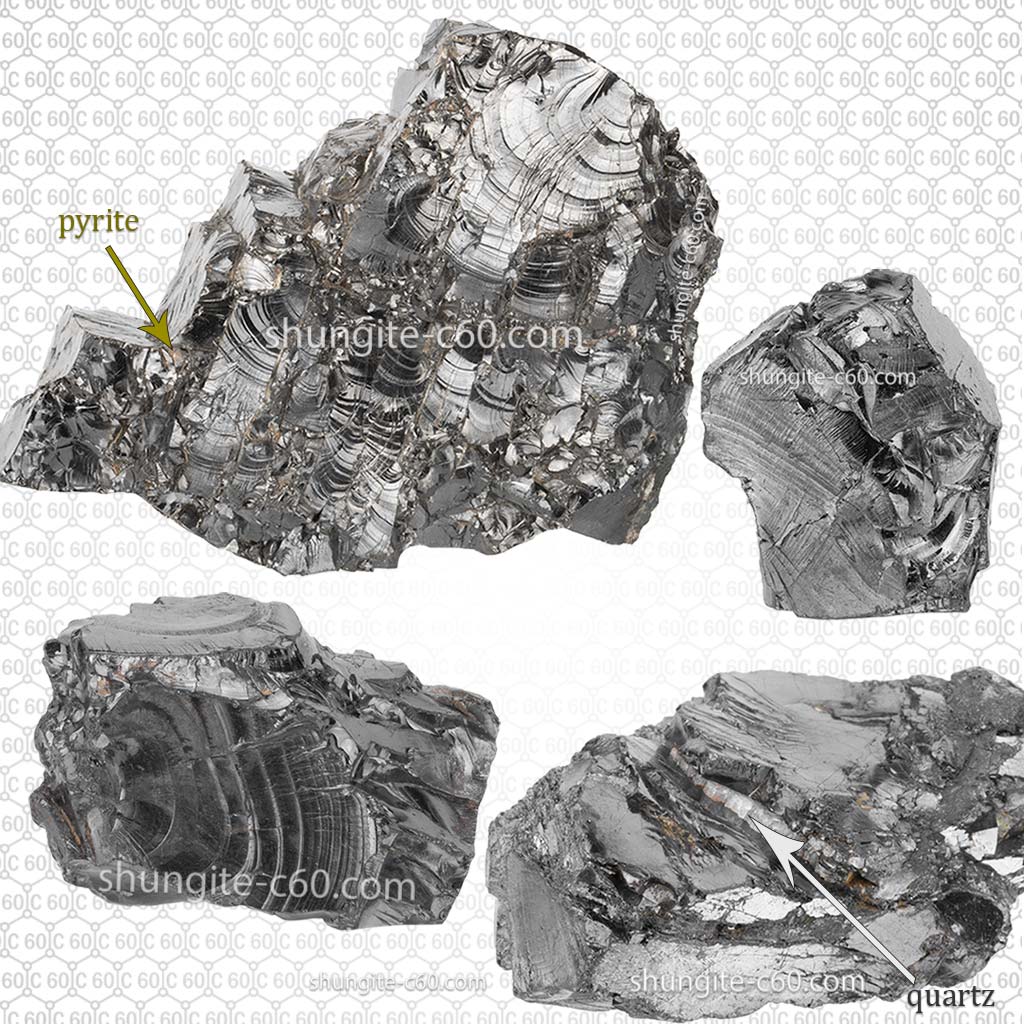
Is rust on Elite shungite harmful?
No, such rust is not dangerous. It’s just iron oxide. This chemical element is also used for food additives. Also, this chemical element is present in water. However, it is worth remembering that a significant content or large doses of any chemical elements that are conditionally safe can harm the health of humans or animals.
Why is it called Elite?
The names – Elite and Noble are absent in the official scientific terminology.
Most likely, it is connected to modern public terminology. This unofficial term appeared among people when there was a need to distinguish two types of Russian rock. It is black (classic) and gray (Elite). Probably, the word “Elite” or “noble” means – the best because it contains 98% of the unique carbon. It also has a black color that appears light silver in the light and a shiny surface. It conducts electricity and is diamagnetic. Probably, these arguments were enough to assign such a weighty prefix to this mineral.
What is the difference between Type 3 and Type 1?
Point of view of science (the first type)
Science does not share this rock on elite or average. Scientific definitions differentiate the types of rock by the areas of its deposit and production because the chemical composition of each deposit is different from that of other stones.
There are many different classifications of Karelian c60 stones from other authors. However, to simplify, scientists and geologists divide the Russian stone into types, from type 1 to type 5, according to Borisov’s classification. For example, according to this classification, the most famous type is black stone. This is – the third type. According to this classification, scientists attribute elite shungite to the first type of the stone.
Russian Stone of the type 3
If we are talking about shungite stones without adding the word Elite, they are black and similar to coal. On their untreated surface are clearly visible veins of Pyrite and Quartz. The content of unique carbon for stone type 3 ranges from 20 to 35% (this figure rarely reaches 60%), depending on the field.
We are able to process this black stone because it contains other minerals and chemical elements. As a result, this type of stone is not as fragile as its elite counterpart. In other words, it makes it possible to produce a variety of geometric shapes, as well as plates, pendants, and other products.
We produce products only from natural raw black Russian stones type 3. Because it is easy to process. But to make, for example, a pyramid or a sphere of elite shungite is impossible because of its fragility and small quantity.
Type 2, Russian Gray Mineral, Petrovsky
The second type of Russian stone includes the so-called Petrovsky. It has a carbon content of 35 to 75% and a matte finish. This type 2 is usually a host rock for elite shungite. That is, in the deposits of the second type of stone, there are small veins of elite shungite of the first type.
Elite Noble silver color stone
Elite shungite, on the other hand, is an extremely fragile and specific mineral that is almost not amenable to processing. It is impossible to make a pyramid or other geometric shapes or products of the correct form, such as cubes.
But we make type 1 noble silver color pendants. Above all, each pendant has a natural, unique shape. You can find them in our store c60.
Above all, silver Russian stone type 1 is an extremely rare stone. It has value for collectors and is also used for infusion water. It is believed that such water positively impacts the human body.
Look at this picture. It clearly shows the difference between the two types of this mineral. Note how distinct the inclusions of pyrite and quartz (quartzite) are on the surface of the black regular type 3 stone. In addition, there is a difference between the Karelian rocks depending on the carbon content and other characteristics.
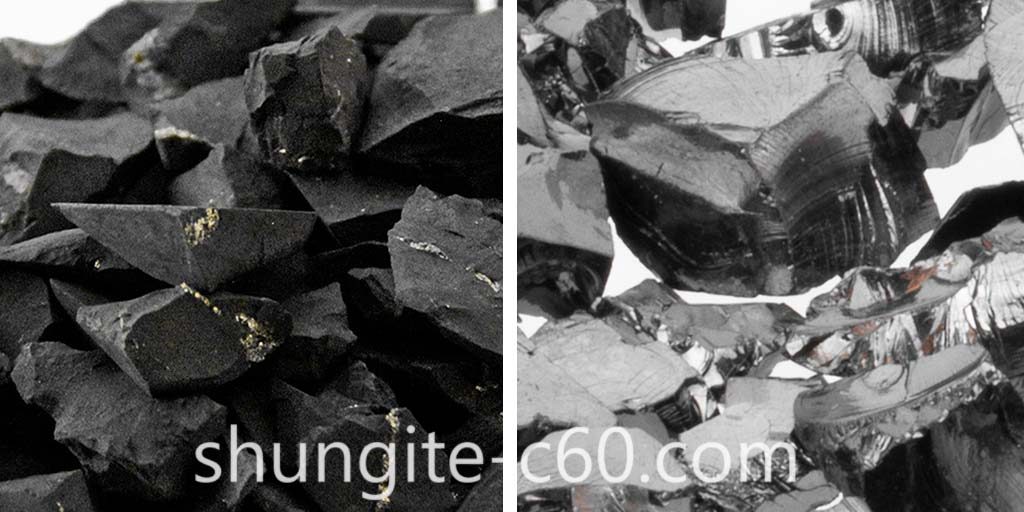

Rare Stone Mining in Karelia, Russia:
Zazhogino field
The largest developed Deposit of the rare rock in Russia. The Location: Zaonezhye, Medvezhyegorsky district, Central Karelia, Russia Federation. This is the only mineral Deposit in which the content of unique carbon begins with a value of 30% and above. It is this rock that received the official scientific name – shungite.
The Rock from this deposit is also called type 3, Zazhoginsky, or Zazhogino.
Numerous scientists have studied this classic (regular) black stone in the field of water treatment. After all, type 3 black stone has unique sorption and cleansing properties, which are why it is used for water purification.
Also, this type of black Karelian stone was the object of research in the protection field against harmful high-frequency electromagnetic radiation. Scientists from different countries carried out these scientific studies. As a result, the researchers found that type 3 Russian black stone can protect against EMF radiation even with a layer thickness of tens and hundreds of microns. This is less than the thickness of a human hair. For this reason, black Russian stone powder has a high EMF protection efficiency, which can be diluted with paint and completely cover surfaces with it for complete protection.
Nigozero Deposit
The largest developed carbon-containing shale is located in Kondopozhsky district, South Karelia, Karelia, Russia. The percentage of unique carbon in these rocks is extremely low. Such rocks are mined in many countries worldwide and are used for genuine black Russian stone. For example, this is a large field in Kazakhstan, a country of the former Soviet Union.
Elite shungite mining
This rare mineral, called elite shungite or noble stone of the first type, was found only in Karelia near the village of Shunga. This is a tiny mining site for a planet as large as ours. Therefore, its deposit was utterly exhausted in the shortest time. Above all, it was already done during the Soviet Union. Now, it is tough to find pieces of this silvery mineral. Each piece is assembled by hand. In this regard, the cost of this rare stone is relatively more expensive than other types of this rock. Now, only crumbs of this rock and small reserves have been collected over the years along the banks of Karelian Lake Onego.
Unscrupulous sellers
However, many unscrupulous sellers from other countries, including Russia, sell rocks similar to this rare stone. Now, many different stones are identical to each other, and the production technologies of artificial rocks and minerals are not.
For example, many scammers currently pass off unknown solid hydrocarbons, such as elite shungite, which they allegedly found in Colombia. There are no Elite shungite deposits in Colombia.
We also did some research, identifying the most striking characteristics that distinguish this fake from the original type 1 stone from Russia.
In this regard, there is a considerable risk of getting a fake. We have repeatedly received messages from our customers about it after as they received from us a sample of genuine elite shungite and had a comparison with samples from other sellers. You can learn more in our extensive article about fakes of the Russian stone.
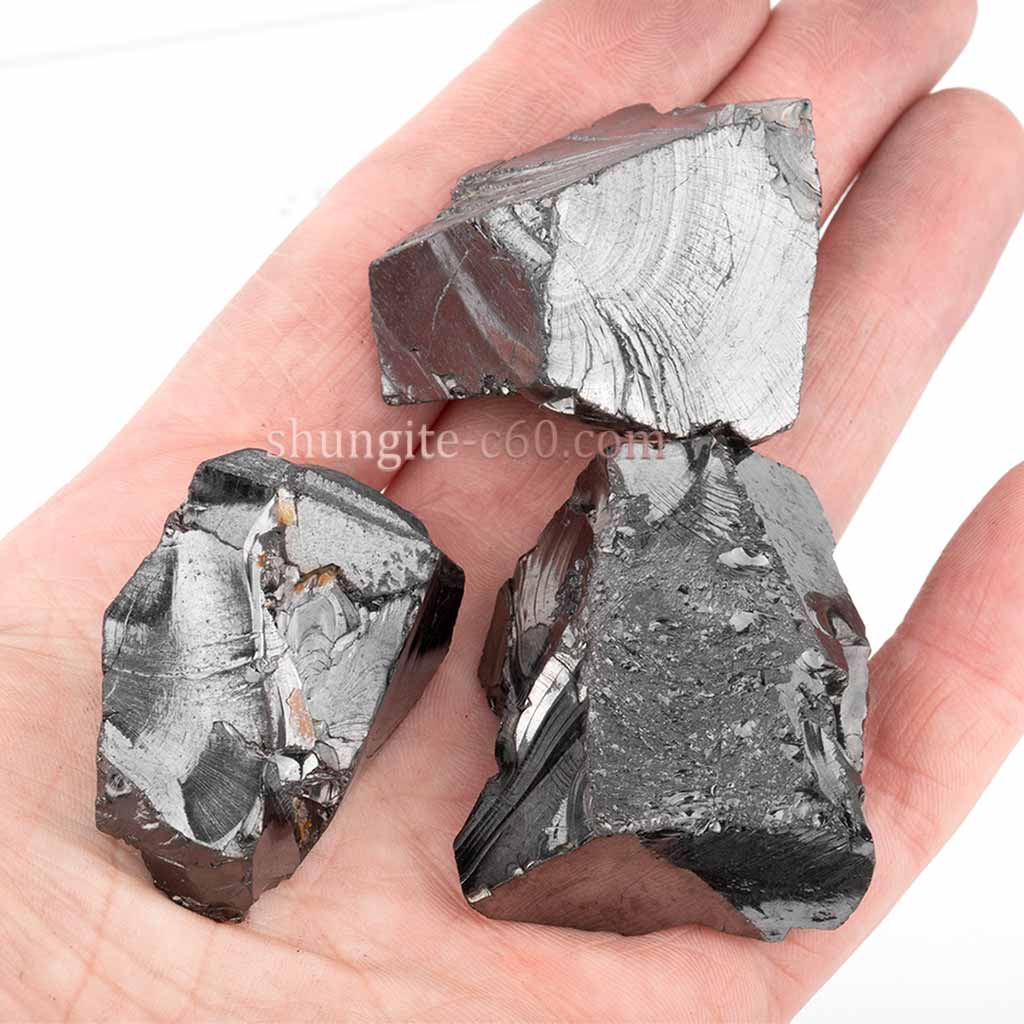
In conclusion, regardless of how the elite shungite appeared on our planet, it still does not deprive it of the right to claim the category of one of the rarest minerals on earth. Above all, we are ready to give you the opportunity to get a particle of this stone directly from us in the Republic of Karelia and give you absolute confidence that you are holding a genuine elite shungite!
